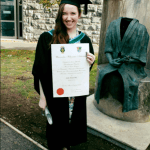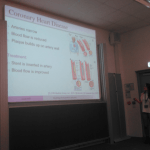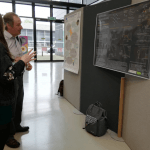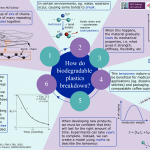Profile
Aoife Hill
-
About Me
I'm from Mayo, doing a PhD in NUI Galway, and enjoy being creative. Two of my greatest loves are my dog, Badger, and cake!
-
Read more
I have loved maths for as long as I can remember! I would wake my mum up early on Saturday mornings and ask her to test me. It was always my favourite subject in school.
Because I have an illness where my body doesn’t make energy properly, I missed a lot of school and worried that I wouldn’t do well in exams. But by staying focused and studying when I was able to, I got to do a degree in Science in NUI Galway. I learnt more about maths than I knew was possible – and now I realise that there is still so much that I don’t know!
I enjoyed my four years in NUI Galway so much that I decided to stay for longer – this time doing a PhD in Biomedical Engineering. It can be challenging sometimes and that’s how I know I’m learning a lot during it.
Time off is so important! I love spending time with my family. Walks on the beach or at a forest help me feel calm. On rainy days, I like painting or doing other crafts, and I also enjoy making jigsaws. Winter is my favourite season, especially when I get to watch movies on front of the fire with my dog, Badger, and have hot chocolate.
-
Read more
During a PhD, you get to pick a topic that hasn’t been fully figured out yet and work on that for (usually) four years.
My topic is plastics that slowly break down when they’re in water (or, more scientifically, biodegradable polymers). The reason I’m looking at these is that they can be very helpful in medicine. For example, if you get injured and need stitches, you might be given “dissolvable” stitches – that means that instead of having to go back to get them taken out, they will slowly disappear as your injury heals. Scientists spent years perfecting these dissolvable stitches. There are many more uses for these materials, but for some of these ideas, we need to better understand how they break down to make them work properly in that setting. That’s what I’m working on.
I use a computer and programming to try to replicate how these dissolvable plastics react when in water. I include different physical and chemical reactions that happen and represent these using maths. I then compare the results with real life experiments. Once we’re confident it captures the behaviour well, we can change small details and see how that affects results. By using a computer, we can get much quicker results than an actual experiment which means new products can be developed more quickly.
These materials are also becoming popular, more sustainable alternatives to typical plastics that don’t break down easily. Rather than the 50+ years a Styrofoam cup takes to break down, a cup made from these dissolvable plastics can fully break down in just 12 weeks (if it ends up in an industrial composter).
-
My Typical Day
My dog wakes me up and asks for breakfast! After he's fed, I have some porridge. I get started working from home around 9am, either reading, writing, or doing experiments on my computer. After a break for lunch, I might have a meeting, a class to teach, or else get back to working on my project. The time I finish working at depends on how long a break I had!
-
Read more
My dog wakes me up and asks for breakfast! After he’s fed, I have some porridge – I love adding lots of toppings.
I get started working from home around 9am. I usually have three main tasks for working on and I choose one to start the day – either reading existing research in the area I work in, writing my thesis (outlining everything I do during my PhD), or doing experiments on my computer. Some days I teach, or prepare notes for my next class.
I often take a long lunch break to clear my head. Some days I walk Badger at this point for us both to get fresh air. Other days I watch an episode of a TV show or take a nap! This break helps me return to work focused and refreshed for the afternoon.
After this break, I might have a meeting or seminar to attend. If not, I get back to working on my project. I like to alternate morning and afternoon activities – if I read in the morning, I might do some programming in the afternoon. The time I finish working at depends on how long a break I had!
-
What I'd do with the prize money
If I won the prize money, I would love to put it towards developing a maths/science escape room-type activity and distributing it to local schools.
-
Education:
I attended Ballyhaunis Community School (2006-2012) and National University of Ireland Galway (2012-).
-
Qualifications:
BSc (Applied Mathematics)
-
Current Job:
PhD student in Biomedical Engineering at NUI Galway
-
My Interview
-
How would you describe yourself in 3 words?
enthusiastic dog-mom and mathematician
What did you want to be after you left school?
Something involving maths - I'm still figuring out the specifics!
Were you ever in trouble at school?
For talking during class (once or twice!)
Who is your favourite singer or band?
Ben Platt
What's your favourite food?
Lasagne (and cake)
What is the most fun thing you've done?
Saw penguins in their natural habitat
If you had 3 wishes for yourself what would they be? - be honest!
A cure for my illness, a house by the beach, and a personal chef!
Tell us a joke.
What did the triangle say to the circle? “You’re pointless.”
-
-
Work photos:
See a quick overview on biodegradable polymers in this talk I gave at FameLab Ireland, a wonderful science communication event: https://www.youtube.com/watch?v=8moHPK3UjLg&t=1s&ab_channel=FameLabIreland
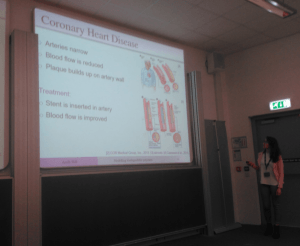
Conference presentation
One of the best parts about doing a PhD is getting to go to conferences around the world, giving you the chance to meet like minded people and develop your scientific communication skills. Here I am presenting my research at a conference in Bath, UK.
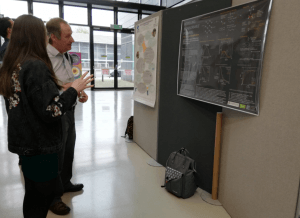
Poster presentation
Poster presentations can be a popular way to present your research as a PhD student. I always enjoy this as it lets my creativity flow.
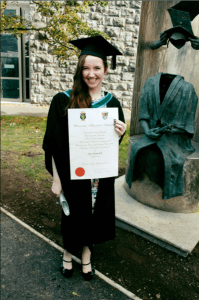
Graduating from my BSc
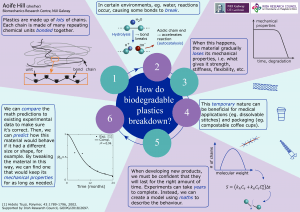
Overview of the research I work on – how do plastics break down?
And how can we use this knowledge to develop new products? (Click the version below my profile picture to see it better.)

